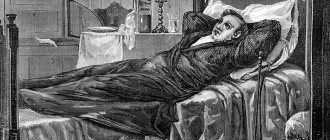How does Ilya Ilyich become “Oblomov”?
Goncharov’s novel “Oblomov” must be re-read whenever a person begins to be overcome by excessive laziness and daydreaming. Very often people are overly lenient with themselves, so they do not pay attention to the small and large weaknesses to which they succumb. And gradually laziness and apathy begin to affect a person more and more. And it is enough to allow such negative qualities to become stronger once, so that later it will be very, very difficult to cope with them.
This is exactly what happened with the main character of the novel “Oblomov”. Ilya Ilyich was not by nature an active and active person. Although, of course, he had all the prerequisites not to vegetate, lying on the couch, but to strive for at least something. Young Ilya Ilyich was smart and educated. It would seem that a brilliant future opens up before him. And how did he manage this future? Extremely unwise and short-sighted. He simply buried all his talents in the ground. It is no wonder that in the future they did not bear any fruit, since there were absolutely no conditions for the growth and further development of all good qualities and abilities.
Let us remember the childhood of Ilya Ilyich. Of course, his childhood can rightfully be called a very happy period. The boy was surrounded by universal love and care. Usually happy and cheerful children grow up into very active people who do not want to turn their lives into a monotonous and gray existence. But with Oblomov everything turned out a little differently. Since childhood, the boy was deprived of the necessary freedom, which is very necessary for optimal personal development. Every person in childhood is a real pioneer, discovering everything new. And little Ilya was spoiled by overly obsessive care; he was not allowed to show any freedom.
The hero’s mother “let him go for a walk in the garden, in the yard, in the meadow, with strict confirmation to the nanny not to leave the child alone, not to allow him near horses, dogs, a goat, not to go far from the house, and most importantly, not to let him into the ravine, like the most terrible place in the area, which enjoyed a bad reputation.” One can easily imagine how a child who was forbidden to express his will in childhood will grow up. Gradually, he begins to lose interest in learning new things. But human life is so short, so every moment is precious.
Ilya Ilyich was deprived of the need to take care of his food, so he did not strive for anything. He knew that he should not be afraid of starvation, and everything else worried him very little. If he had been born into a poor family, from childhood he would have seen the constant work of loved ones in front of him, then he might have had a different attitude towards life in general. Oblomov is very carefree and carefree. In youth, such qualities can be forgiven, but as a person grows up, responsibility for his own destiny must appear. Meanwhile, Ilya Ilyich himself does not strive for anything at all, therefore he bears absolutely no responsibility for his life. He acts like he doesn't care.
And gradually everything really becomes indifferent to him. As a child, Ilya loved to listen to his nanny’s fairy tales. And, obviously, fairy-tale fiction was so close and understandable to him that as he grew older, he could not get rid of his completely unnecessary and worthless daydreaming. “Although the adult Ilya Ilyich later learns that there are no honey and milk rivers, no good sorceresses, although he jokes with a smile at his nanny’s stories, this smile is insincere, it is accompanied by a secret sigh: his fairy tale is mixed with life, and he is powerless sometimes it makes me sad, why isn’t life a fairy tale, and why isn’t life a fairy tale…”
Many people like to dream, but this quality can be both positive and negative. A dream can help a person move forward, achieve new things, and make amazing discoveries. In a word, a dream can push you to take active actions. But in another case, a dream may turn out to be the only achievement that a person is capable of. And that's the worst part. In this case, the dream turns out to be a destructive factor that prevents a person from moving forward and developing optimally. This is exactly what happened with Oblomov. He spends his days in fruitless dreams, thinking about nothing else. “Everything pulls him in that direction, where they only know that they are walking, where there are no worries and sorrows; he always has the disposition to lie on the stove, walk around in a ready-made, unearned dress and eat at the expense of the good sorceress.”
Oblomov Ilya Ilyich replaces real life with fictional one. Gradually, he loses strength, because inaction undermines a person from the inside, makes him weak and weak-willed. We can say that Ilya Ilyich by nature has a weak character, and this is precisely his main tragedy. But, on the other hand, a person’s character is formed in encounters with difficulties. Namely, it was difficulties that Ilya Ilyich feared and avoided most of all. He consciously does everything possible to turn his life into a serenely lazy dream. Suffice it to recall his attitude towards service. Ilya Ilyich would like service to be something like an optional and easy activity. If this were the case, no doubt he would willingly go to work. But when confronted with reality, Ilya Ilyich realized that service required significant effort, which he was not at all ready to spend on it.
It is interesting how Goncharov characterizes Oblomov’s views: “Life in his eyes was divided into two halves: one consisted of work and boredom - these were synonyms for him; the other - from peace and peaceful fun. Because of this, the main field - service at first puzzled him in the most unpleasant way.
In fact, service is necessary for every person as a means of self-expression. Responsibilities for which one must be held accountable discipline a person, do not allow him to become disorganized, and also fill life with meaning. Oblomov, at any cost, tries to free himself from his responsibilities. He strives for relaxation and pleasure, not realizing that in fact, rest is good and pleasant only after completed tasks. Ilya Ilyich is not ready to take responsibility for his actions. And the very first failure shows this. Suffice it to remember that once Ilya Ilyich made a mistake and sent important documents to the wrong city. When they began to look for the culprit, “Oblomov did not wait for the well-deserved punishment, he went home and sent a medical certificate.”
The medical certificate stated that Oblomov was very seriously ill, so he needed to “abstain from mental pursuits and all activities.” Oblomov very cleverly avoided responsibility; he simply left his service with the intention of never returning there, that is, he resigned. And this act very clearly characterizes his personal qualities. Oblomov did not even try to find any interest in his work; he was frightened by the difficulties.
Is Oblomov significantly different from most people? Of course, laziness, apathy and inertia, to one degree or another, are characteristic of many. The reasons for the emergence of such qualities may be different. Some people believe that their whole life is a continuous series of failures and disappointments, and therefore they do not strive to change it for the better. Others are afraid of difficulties, so they try to protect themselves from them as much as possible. However, people still have to face reality, learn its cruel sides, struggle with difficulties in order to celebrate success or suffer defeat as a result. This is precisely the meaning of human life.
If a person decides to protect himself from all possible and impossible difficulties, then his life gradually turns into something completely monstrous and ugly. This is exactly what happened to Oblomov. Reluctance to live according to the existing laws of life leads to gradual but very rapid degradation. At first, a person thinks that everything can still be changed, that very little time will pass and he will “resurrect”, throw off laziness and despondency, like an old dress, and take up the things that have been waiting for him for a long time. But time passes, strength is depleted. And the person still remains in the same place.
Ilya Ilyich deliberately deprives himself of a pleasant pastime and various pleasures. For example, he refuses to communicate with women because he does not want unnecessary hassle. But once in his youth, Ilya Ilyich also thought about family happiness. True, his prospect seemed somehow cloudy and unrealistic. But still such thoughts sometimes appeared in his mind.
Gradually, Oblomov refuses to meet with friends; communication begins to burden him. “Almost nothing attracted him from home, and every day he settled more and more firmly in his apartment.” Oblomov turns into a weak-willed and spineless creature. This is his great tragedy. A person deprives himself of real life with its hectic activity and receives absolutely nothing in return. I feel sorry for Oblomov, but no one but himself is to blame for this tragedy. And even if Ilya Ilyich himself does not realize it, in fact his misfortune is enormous. He could not find a place for himself in life and found himself on the sidelines.
It is paradoxical that during the short period of his service, when Oblomov was frightened by the need to spend a lot of time on work, he was bothered by the thought: “When will I live? When to live? He was afraid that constant responsibilities would take away his personal time, deprive him of the joy and fullness of life sensations. But when Oblomov left the service, nothing good or interesting appeared in his life. He strove for freedom in order to “live,” but at the same time refused a real, full-blooded and vibrant life.
Ilya Ilyich Oblomov
Oblomov. Actor O. Tabakov. Film “A few days in the life of I.I. Oblomov." 1979
Ilya Ilyich Oblomov is the central character of the novel of the same name by I.A. Goncharova. The hero lives in St. Petersburg, where he moved from his family estate. Ilya Ilyich is a man who has long been deprived of any aspirations and hopes, who voluntarily confined himself within the four walls of a rented apartment. The emergence of the social phenomenon “Oblomovism” in Russia is largely due to the hero of this work, who is a symbol of stagnation, apathy and complete inactivity.
Description of the hero
Appearance
Ilya Ilyich was in his fourth decade - at the time of the events he was 32 years old. He is a man of average height, handsome, with a calm and soft expression on his face. Dark gray eyes express goodwill, but there is absolutely no concentration in them. Sometimes a fleeting thought “hid itself in the folds of the forehead, then completely disappeared, and then an even light of carelessness glowed throughout the face.” Carelessness and some kind of warm-heartedness shine through in the entire appearance of the hero. The flabbyness that his body acquired too early and the unhealthy complexion indicate that the hero rarely spends time outdoors and moves too little. Oblomov’s favorite place to live is an old sofa, his usual clothes are an enormous oriental robe and soft shoes. This home wardrobe is in perfect harmony with the entire appearance of its owner.
Character
Illustration for the novel “Oblomov”. Artist K. Tikhomirov
Apathy and laziness are Oblomov’s pronounced negative traits. This type of character was formed in him as a child, in the atmosphere of the sleepy kingdom in which the inhabitants of Oblomovka lived. No one instilled in him even a small portion of those necessary skills that are useful to a person entering adulthood. Not he himself, but others were always the fulfillers of his desires, but his parents did not see anything reprehensible in this. After all, the boy is a gentleman, even if he is a small one, and it is not appropriate for barchuks to overwork themselves according to their class. This upbringing resulted in the fact that the adult Oblomov still continues to hope that someone will come and solve all his problems for him. Even a letter from the manager of Oblomovka is unable to get him off the couch to figure out what is happening on the estate.
But there are also positive sides to Ilya Ilyich’s character. First of all, it is kindness and responsiveness, the ability to sympathize. Oblomov is also endowed with such a property as insight. After all, thanks to her, he was the first to understand that a relationship with Olga was a road to nowhere. Dreaminess, romanticism, and the ability to subtly feel and experience are not alien to the hero. Unfortunately, his fate was such that these fantasies and dreams were not destined to come true. Meanwhile, he feels good in his dreams, because there he does not need to adapt to the cruel world around him, which he does not accept with his whole being.
The apartment where the hero lives looks uncomfortable and neglected. Zakhar does the cleaning, and then, rather, for appearances. If you look closely, you can see cobwebs hanging in the corners, carpets covered in stains, trash under cabinets, dishes not put away. There is a feeling of uninhabitedness and emptiness everywhere. If it weren’t for the sofa with Oblomov, one would think that no one had lived here for a long time.
Biographical elements
Currently, Oblomov owns a family estate with three hundred peasants. This is an inheritance he inherited from his father. It is worth briefly mentioning Oblomov’s parents - good-natured people, adherents of the patriarchal way of life. Their life passed in complete serenity and peace. Father “sat at the window all morning and strictly watched everything that was happening in the yard,” Ilyusha’s mother spent the whole day giving various orders regarding household matters. Her love for her only son knew no bounds. Every morning she showered “him with passionate kisses”, then peered into him “with greedy, caring eyes, whether his eyes were cloudy... if anything hurt.”
From childhood, Ilya Ilyich learned that life is a “quiet river” that flows by, and the ideal of life is idleness and inaction. While still just a child, he built a program for his future life, the model for which was life in Oblomovka. One of the main concerns of the inhabitants of the estate was concern for food: “What calves grew fat there for the annual holidays! What a bird was raised!.. What stocks of jams, pickles, and cookies were there! What honeys, what kvass were brewed, what pies were baked in Oblomovka!”
No one dared to break the age-old tradition - an afternoon nap, which was “the true likeness of death.” Everyone was asleep - the owners, servants, courtyard girls, groom, gardener and other numerous servants. The boy was looking forward to the moment when there was dead silence in the house. At this time, he became left to his own devices and felt like the only one in the whole world. Despite his inquisitive mind, the child, due to his age, did not offer any resistance to the atmosphere of stagnation that reigned in the estate. On long winter evenings, putting Ilyusha to bed, the nanny told him “about some unknown side, where there are neither nights nor cold, where miracles happen, where rivers of honey and milk flow, where no one does anything all year round, and day- Everyday they only know that all the good fellows are walking, such as Ilya Ilyich, and beauties, no matter what you can say in a fairy tale or describe with a pen.” Even in adulthood, Oblomov will continue to believe in miracles, involuntarily regretting why “a fairy tale is not life, and life is not a fairy tale.” He “will forever have the disposition to lie on the stove, walk around in a ready-made, unearned dress and eat at the expense of the good sorceress.”
Studying at a boarding school, moving to St. Petersburg
The time has come to study and “father and mother put the spoiled one Ilyusha in front of a book.” He had to study at a boarding school, which was organized by Ivan Bogdanich Stolz for noble children. His son Andrei became Ilyusha's classmate. Young Oblomov had no desire to learn at all, and his parents saw the only benefit in his education: “they dreamed of an embroidered uniform for him, they imagined him as a councilor in the chamber, and his mother even as a governor.” But they wanted their boy to achieve all this without bothering too much, “somehow cheaper, with different tricks.” In the boarding school, where Oblomov stayed until he was fifteen years old, he, just like at home, was cherished, “like an exotic flower in a greenhouse, and just like the last one under glass, he grew slowly and sluggishly.”
Then he studied in Moscow, after which Oblomov never used the sciences he studied in his life. He justified it this way: “Political economy, for example, algebra, geometry - what am I going to do with them in Oblomovka?” However, vanity and dreams of a brilliant career prompted him to move to St. Petersburg. He took his faithful servant Zakhar with him and lived with him in two rooms, but after he became the owner of Oblomovka, he was able to afford “a larger apartment, added a cook to his staff and got a couple of horses.”
Service, career and guests of Oblomov
Ilya Oblomov. Actor O. Tabakov. Film “A few days in the life of I.I. Oblomov." 1979
In St. Petersburg, Oblomov got a job in the office. He performed minor work corresponding to his position as a collegiate secretary. One day he mixed up the addresses and sent a service letter not to Astrakhan, but to Arkhangelsk. This circumstance frightened Oblomov so much that, out of fear of his superiors, he was forced to resign. This was the end of his never-begun career. Having become free, he initially attended social events, but having become disillusioned with a society riddled with lies, envy and gossip, he began to do this less and less. Then he set himself the goal of bringing order to Oblomovka, getting married and living a carefree life there, like his parents. But the laziness that he absorbed with his mother’s milk did not allow him to carry out his plans.
Oblomov has several friends who visit him regularly. Sudbinsky, Volkov and Penkin drop in rarely and for just a few minutes. People like Alekseev and Tarantiev pay thorough visits. At Oblomov’s they eat, drink, smoke expensive cigars, in a word, they find in his house “a warm, peaceful shelter and always the same, if not warm, but indifferent welcome.” And Ilya Ilyich himself was already accustomed to these people. Alekseev allows him “to live in his own way, that is, lie silently, doze or walk around the room...”. He endures “equally his silence, his conversation, his excitement, and his way of thinking, whatever it may be.” A completely different Tarantiev. He brings “life, movement, and sometimes news from the outside” into Oblomov’s sleepy kingdom. In addition, Oblomov naively hopes that Tarantiev “is really able to advise him something worthwhile.”
Oblomov's dreams
Lying on the sofa, Oblomov “loved to withdraw into himself and live in the world he created.” His head was visited by lofty ideas, in his imagination he felt like a hero - the winner of universal evil. Sometimes he imagined himself as an artist or a great, invincible commander. But when in his dreams he encountered some problem, he began to “pray fervently, earnestly, begging the sky to somehow ward off the threatening storm.” After this, he again became indifferent and indifferent to everything. Even the letter from the manager from Oblomovka and the owner’s demand to vacate the apartment were relegated somewhere far away, to the back burner.
Oblomov was able to realize the whole tragedy of his situation and the fact that “there is buried in him, as in a grave, some good, bright beginning, perhaps now dead, or it lies like gold in the depths of a mountain, and it would be high time for this to happen.” gold to be a walking coin."
Oblomov and Stolz
The friendship between Oblomov and Stolz dates back to early childhood. Then they studied together at a boarding school, and to this day Stolz remains the only person close to Oblomov. In their youth, they were both romantics and dreamers, they were going to “travel the length and breadth of Europe, walk through Switzerland, burn their feet on Vesuvius, go down to Herculaneus.” Only in front of Stoltz can Ilya Ilyich be completely frank and sincere; he discusses his health with him, asks him for advice: “Give me your will and mind and lead me where you want. Maybe I’ll follow you, but I won’t budge alone.”
Stolz is an active and active young man. For him, traveling is a common thing, unlike Oblomov, who “was so spoiled” that he was unable to move out of his apartment. Is it worth talking about long journeys, when Oblomov’s only trip was the road from the estate to Moscow. And she walked with a bunch of servants, “among feather beds, caskets, suitcases, hams, rolls, all sorts of fried and boiled cattle and poultry.”
However, Stolz still manages to interrupt his friend’s seclusion. He intends to bring him back into society. After much persistence, Oblomov agrees, and this can be considered a real feat, the first step towards a “cure.” But during his endless visits, Oblomov begins to notice that representatives of the world are “sleeping people.” “Don’t they sleep sitting all their lives? Why am I more guilty than them, lying at home and not infecting my head with threes and jacks? Oblomov is trying to prove to his friend that social life is the center of lies and hypocrisy, which in no way corresponds to his idea of happiness. He again dreams of life in Oblomovka with his family, in a house with elegant furniture, a piano, and books. This is the very paradise that his imagination depicts.
Before leaving abroad, Stolz makes Oblomov promise that he will come to him in Paris. The strength returning to the hero triumphs over laziness, and he begins to prepare for the journey. He orders travel clothes for himself, buys a suitcase and receives a foreign passport. But he never goes anywhere due to the fact that just before the trip, “his lip got swollen at night.” The comicality of this justification demonstrates better than any words the impossibility for Oblomov to live the life that his friend Stolz leads.
Oblomov and Olga Ilyinskaya
Oblomov and Olga Ilyinskaya. Film “A few days in the life of I.I. Oblomov." 1979
Having settled in St. Petersburg, Oblomov sometimes started relationships with women, but this was only a fleeting crush that never turned into true love. Then he deliberately stopped communicating with the weaker sex in order to avoid various hassles. Oblomov’s soul was stirred by his meeting with Olga Ilyinskaya, with whom he fell in love at first sight. The girl again gave him the desire to live and love. Under the influence of this meeting, Ilya Ilyich began to change, he stopped sleeping after lunch, began reading books, and taking long walks with Olga. Everything began to change after he proposed to the girl and received her consent to become his wife. He was suddenly overwhelmed by thoughts about the upcoming troubles that inevitably accompany preparations for the wedding. The very first attempts to restore order in his affairs turned out to be so overwhelming for Oblomov that his feeling began to fade away. Olga, who so actively took up the task of re-educating Oblomov, realized that her efforts were in vain. Considering it impossible for herself to live like Oblomov, she decided to break up with him.
Oblomov had a hard time being separated from Olga. He was ill for a long time and “little by little he returned to his previous normal life.” However, he was heartily happy for her when he received the news that she had married Stolz. “God himself blessed you! My God! how happy I am!..”
Oblomov and Pshenitsyna
Agafya Matveevna Pshenitsyna was Tarantiev’s godfather, who advised Oblomov to rent an apartment from her on the Vyborg side. He immediately fell in love with this simple and hardworking woman, the widow of an official who at one time held the same post as Oblomov. In turn, Pshenitsyna also treated Ilya Ilyich very well, helped and took care of him. Oblomov realized that Agafya Matveevna’s house was the very piece of paradise that he had dreamed of all his life. Here everything was the same as in beloved Oblomovka, the same conversations about food and provisions, the same peacefully flowing, monotonous days in which there is no place for storms and upheavals.
Here Oblomov became a father for the first time - he had a son, named Andrei in honor of Stolz. Analyzing his life, Ilya Ilyich decided that “he has nowhere else to go, nothing to look for... the ideal of his life has come true.” Oblomov lived quietly and calmly, just as calmly and quietly he passed away, “without pain, without torment, as if a watch had stopped and they had forgotten to wind it.”
The role of the hero in the work
Oblomov is a shining example of a patriarchal nobleman. In the novel, he plays the role of a “superfluous person” who does not accept modern society and is forever stuck in the past. The environment to which his best friend Andrei Stolts and his beloved Olga Ilyinskaya belong is absolutely alien to him. The writer shows “Oblomovism” with its attraction to the distant past, inactivity, indifference and spiritual degradation, when a person turns into biomass lying on the sofa.
At the same time, Goncharov ambiguously portrays representatives of the modern world. Almost each of them is deprived of that peace of mind and inner dreaminess that Oblomov had. Even Stolz finds this peace only in Oblomov’s house. By creating the image of the main character, the author seeks to convey the idea that, despite positive character traits, such as kindness and responsiveness, constant work on developing one’s own personality is necessary. Otherwise, a person will face the same dead-end stagnation into which Oblomov voluntarily drove himself.
Character development as the story progresses
The first acquaintance with the hero occurs when Ilyusha Oblomov is only seven years old; the last chapters describe events that occurred thirty-seven years later. To better understand what changes the main character undergoes throughout the narrative, it is necessary to pay attention to “Oblomov’s Dream”, in which he returns to childhood, to the village where his beloved mother is still alive, where everyone - both masters and servants - is in the kingdom sleep and peace, where “the norm of life was ready and taught to them by their parents, and they accepted it, also ready, from their grandfather, and grandfather from their great-grandfather, with a covenant to preserve its value and inviolability.”
Step by step Oblomov is approaching his degradation. First comes dismissal from service, then loss of interest in society and the outside world as a whole. The hero is left with only a sofa, an enormous robe and slippers. He steadily sinks into complete spiritual apathy and laziness. Even Stolz, full of energy, is not able to awaken in him the desire to start living, and not to continue a meaningless existence. In response, he hears: “I know everything, I understand everything, but there is no willpower.” Oblomov’s love for Olga Ilyinskaya also failed to revive. He is afraid of those qualities unattainable for him that will make him worthy of the love of this girl. He finds his ideal in the house of Agafya Pshenitsyna, who, unlike Olga, does not demand any changes from Oblomov, and loves him as he is.
The author's attitude towards the hero
The author's position in relation to Oblomov is ambiguous. Describing in detail the life of the main character, his way of thinking, Goncharov has a rather positive attitude towards Mr. Oblomov. He even sympathizes with him in his helplessness and inadequacy. He understands that Oblomov is a victim of parental upbringing, and his infantility is a product of the lordly environment, where landowners lead an idle life at the expense of the labor of serfs.
Goncharov shows Oblomov’s positive character traits, such as kindness, decency, intelligence, honesty, so that the reader feels that in front of him, first of all, is a person. At the same time, at times one can feel the author’s antipathy towards the hero for his laziness, incompetence and cowardice. In the finale, Goncharov does not indicate his position in relation to any hero. It remains unknown whose side he takes - the energetic Stolz or the passive Oblomov. Nevertheless, it becomes clear that it was precisely the long-outdated “Oblomovism” that became the cause of the hero’s degradation.
Prototypes
The history of the work is rooted in the life history of I.A. himself. Goncharova. As the writer himself admitted, it was especially important for him to describe complete reality, without straying into the “soil of a thinker.” Thus, we can conclude that the author based his main character on himself. The writer’s contemporaries also spoke about this, finding many coincidences in Goncharov and Oblomov. Both of them came from the Russian patriarchal hinterland, both were distinguished by slowness and, to some extent, laziness, but at the same time, both were smart and decent.
Film adaptations of the hero
Ilya Ilyich Oblomov. Actor O. Basilashvili. T/SP "Oblomov". 1965
In 1965, director and screenwriter, People's Artist of the Russian Federation Alexander Belinsky staged the television play "Oblomov", which became the first film adaptation of the famous novel by I.A. Goncharova. To embody the image of Oblomov, he invited the famous actor Oleg Basilashvili to his work.
In April 1980, the premiere of the two-part feature film “A few days in the life of I.I. Oblomov." The work of director Nikita Mikhalkov is still recognized as the best screen version of the novel. Mikhalkov invited everyone's favorite actor Oleg Tabakov to play the role of Oblomov. Oblomov Tabakov turned out to be very natural and touching. Good-natured, soft, lazy, dreamy - this is how the viewer sees Oblomov performed by Oleg Pavlovich. Although Tabakov himself repeatedly repeated that in reality he was Stolz rather than Bogatyrev. Despite this, the role of Oblomov is one of the best in Oleg Pavlovich Tabakov’s collection.
Literature
- Musatov E.I. From the creative history of the novel by I.A. Goncharov “Oblomov” // Izv. Academy of Sciences of the USSR. Ser. lit. and language T. 24. Issue. 4. - 1965.
- Gorelov A.E. Oblomovshchina: I.A. Goncharov // Gorelov A.E. Essays on Russian writers. - L., 1968. - P. 253-314.
- Frolov V. Oblomov and Oblomovism // Moscow. Truth. — 1969.
- Krasnoshchekova E.A. "Oblomov" I.A. Goncharova. - M.: Artist. lit., 1970.
- Taboriskaya E.M. The author and hero in the novel by I.A. Goncharov “Oblomov” // Izv. Voronezh. ped. in-ta. — Voronezh, 1972.
- Odintsov V.V. Artistic image and style: About the novel by I.A. Goncharov “Oblomov” // Rus. speech. — 1973.





